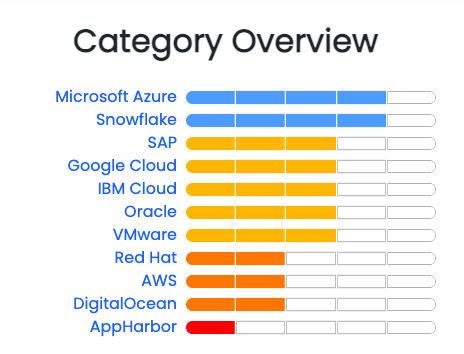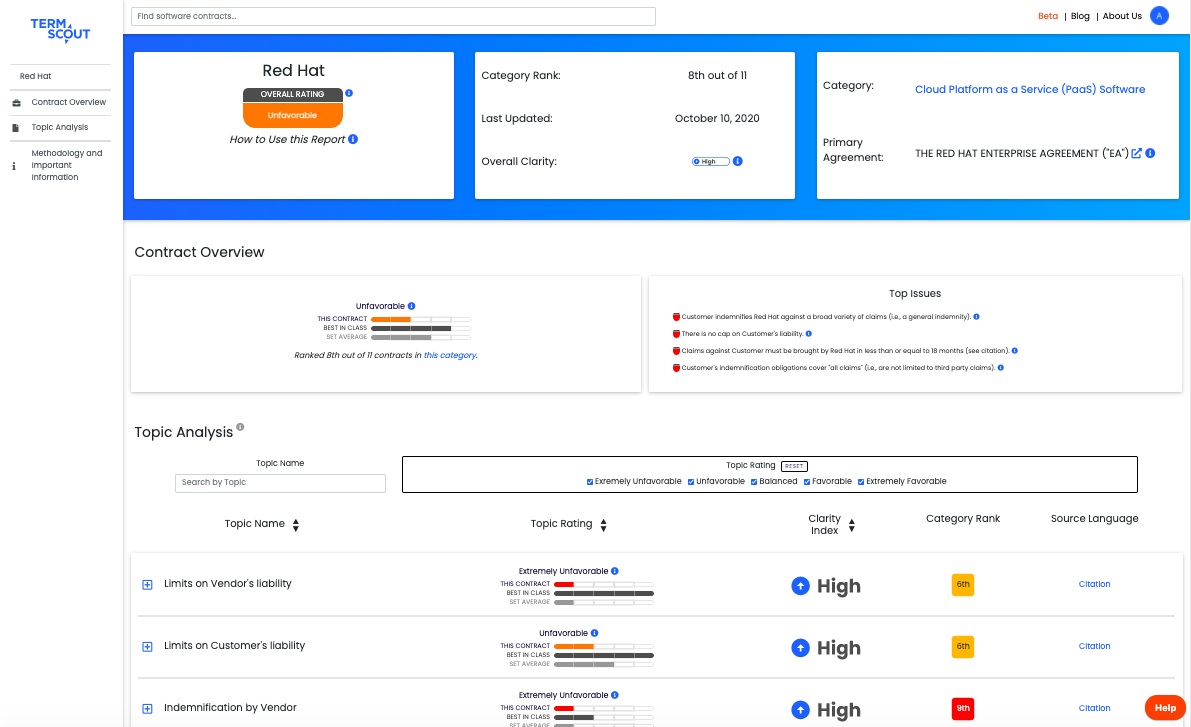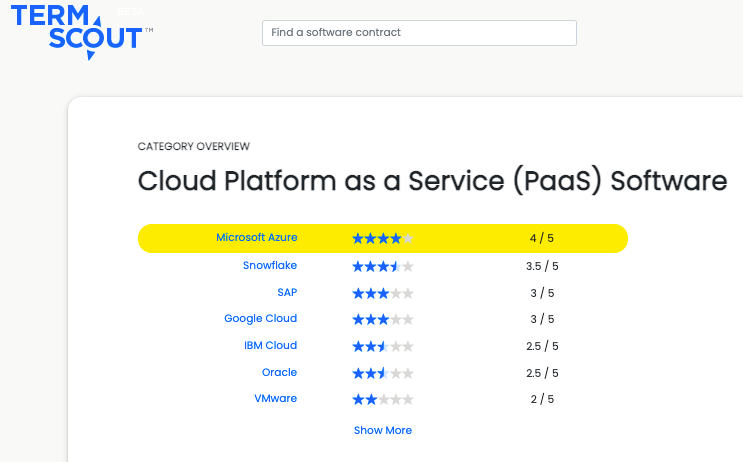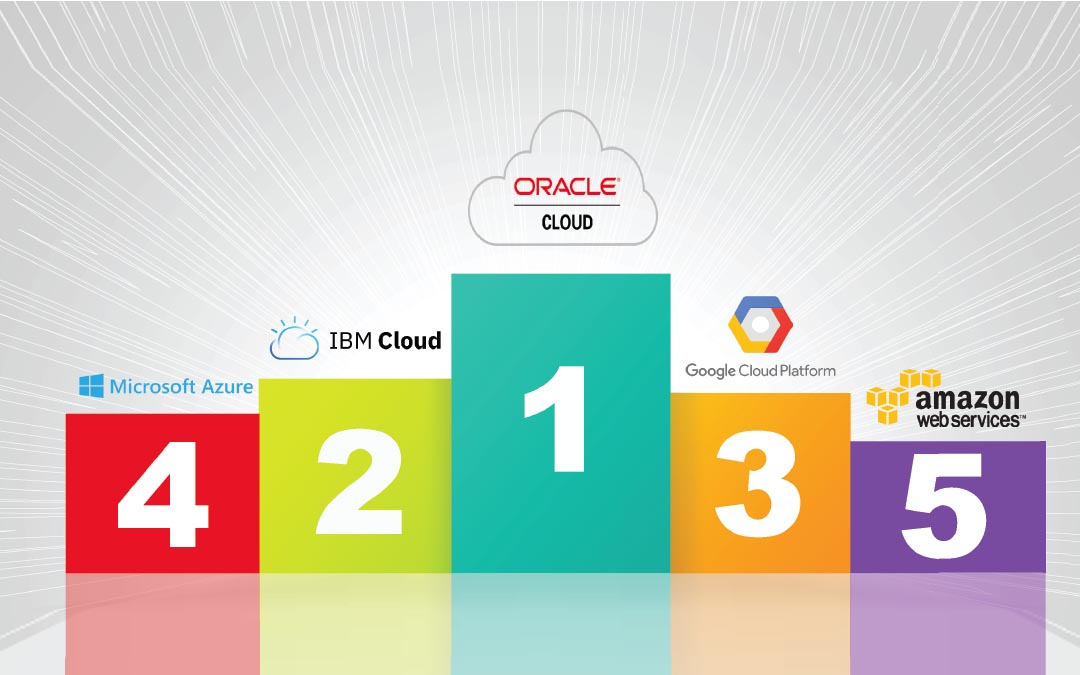Contract Terms Shootout – How Do the Top 10 Cloud Companies’ Contracts Compare?
Cloud Platform as a Service (PaaS) — Contracts Comparison
We have all been there. Our business needs a good or service to further its operations. You have decided on the product you want and are all ready to go. Then you get the vendor’s contract terms and have to decide whether to spend thousands of dollars and weeks of time to conduct a proper review and potentially negotiate terms. You would love to just move forward and wonder “How risky would it really be to just do what I do when I download an app and simply click ‘I Accept’ and move forward right away?”
TermScout recently looked to answer this question by conducting a line-by-line analysis of the standard contract terms used by 11 Platform as a Service providers of differing sizes and levels of maturity. The short answer is that the level of risk varies significantly depending upon which vendor you want to do business with. See the full Cloud Platform as a Service (PaaS) report here.
The TermScout Approach
TermScout is an online contract review platform that identifies the key gotchas in vendor contracts, letting you immediately see how favorable or unfavorable a vendor’s terms are and how those terms stack up against those offered by competing vendors. We review contract provisions line by line, analyzing over 600 data points in every contract, using a combination of AI and licensed attorneys. TermScout then presents you with the bottom line as to whether this is a fair contract, with simple graphics, summaries, and pointers back to the contract itself. The result is the most comprehensive and easy to use review of public-facing contracts available on the market.
TermScout recently analyzed the standard contract terms offered by Microsoft Azure, AWS, Google Cloud, Red Hat, IBM, Oracle, Snowflake, AppHarbor, VMware, SAP, and Digital Ocean. We look to see how favorable each vendor’s terms were to the customer in 18 different topics such as liability, data, and indemnification, then compared them to see how risky it would be for a customer to simply do business on those terms. This analysis shows that risk levels differ significantly by company.

Top Cloud Vendors Listed in Order of
Overall Contract Favorability to Customers
(Most Favorable is on Top)
Two companies – Microsoft Azure and Snowflake – earned Favorable ratings overall from TermScout, meaning that the totality of their terms are more favorable to the customer than those that a buyer without significant leverage can usually expect to obtain. This does not mean that the terms are perfect. In selected topic areas, each of these providers offered terms that TermScout rated as Unfavorable or even Extremely Unfavorable. Doing business on the standard terms offered by these companies is not risk free, but involves substantially less risk than doing business on the terms offered by many of their competitors.
Middle Performers – Medium Risk
Five companies – SAP, Google, IBM, Oracle and Vmware – earned Balanced ratings overall from TermScout, meaning that the totality of their terms are about average in terms of what a customer having no leverage can expect to obtain. At a topic level, the customer favorability of the terms offered by each of these vendors varied significantly, ranging from Extremely Favorable to Extremely Unfavorable. Doing business on the standard terms offered by these companies involves a higher level of risk that doing business with a top performer.
Bottom Performers – Highest Risk
Three companies – Red Hat, AWS, and Digital Ocean – earned Unfavorable ratings (or worse) overall from TermScout, meaning that the totality of their terms were less customer favorable than what a buyer with no leverage can generally expect to receive. AppHarbor earned TermScout’s lowest possible rating of Extremely Unfavorable, putting it at the bottom of the pack. As with the other companies, ratings at the topic levels varied, but were more likely to be customer unfavorable. Doing business on the standard terms offered by these companies presents the highest level of risk to the buyer.
Summary
Deciding whether to do business on a standard set of terms involves a risk assessment that each company has to make balancing its business needs and levels of risk tolerance. The standard terms offered by all vendors in this software category present at least some risks to the buyer. The level of this risk, however, varies significantly by vendor. Buyers doing business on the standard terms of the top performers will incur less (and potentially significantly less) risk than those doing business on the standard terms of the lower performers.
In order to fully understand the agreement you’re signing, and to ensure you are aware of what all of its details entail, head over to TermScout.com and sign up for an account today.
Disclaimer: * All Information shown is accurate as of December 11, 2020, but is subject to change as TermScout expands its contract database and vendors change their terms.*
Share this
You May Also Like
These Related Stories

Red Hat Customer Agreement: the Good and the Bad

TermScout Launches Contract-Rating Platform with Free Comparisons of Over 150 Software Companies

.png?width=130&height=53&name=Vector%20(21).png)